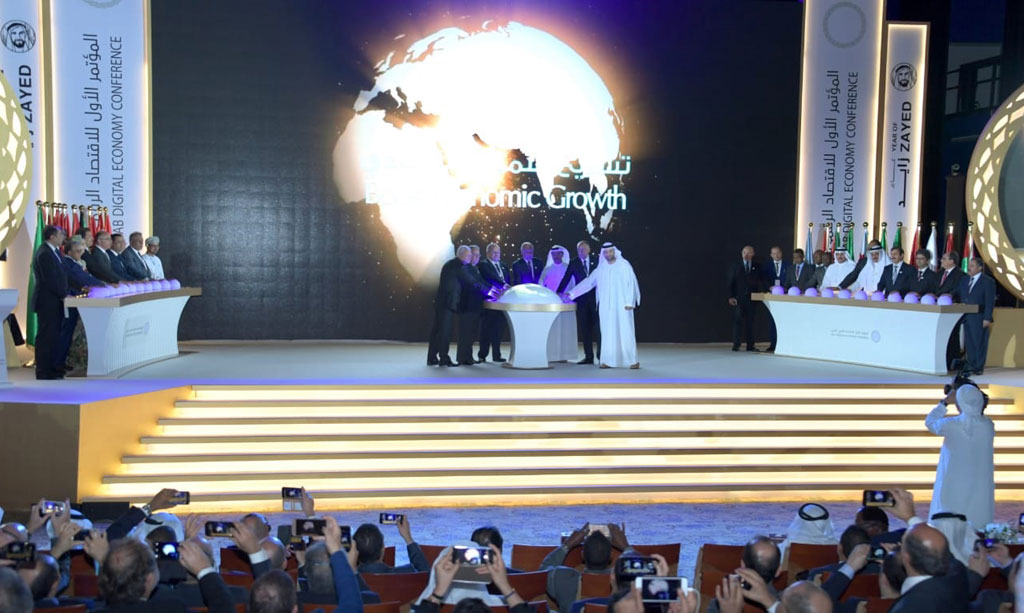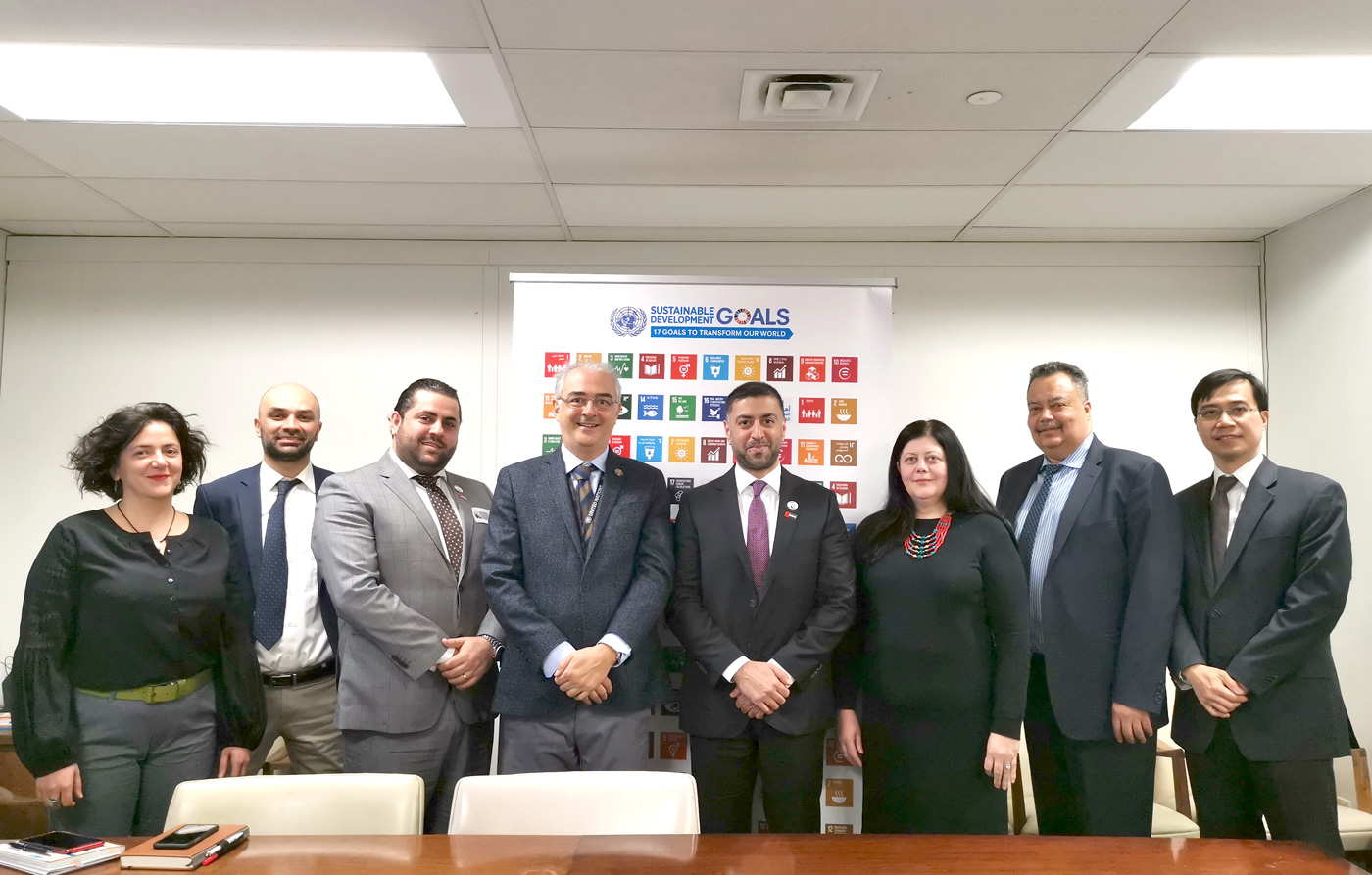
Archive picture of launching the strategic Arab Common Vision for Digital Economy in Abu Dhabi – December 2018
Mr. Mourad Wahba, Assistant Secretary-General of the United Nations, Assistant Administrator of UNDP and Director of the UNDP Regional Bureau for Arab States, valued the efforts of UAE leadership, and the sharp vision looking forward to the future of H.H. Sheikh Mohammed bin Zayed Al Nahyan, Crown Prince of the Emirate of Abu Dhabi, sponsoring the strategic Arab Common Vision for Digital Economy, as well as the programs and projects stemming out of it.
Also, the senior officials of World Bank praised the strategic Arab Common Vision for Digital Economy, and emphasized the importance of coordinating efforts of Arab countries supporting their transformation towards sustainable digital economies, they also showed their appreciation of the UAE leadership supporting economic stability, and improving its growth rate, as it is a way to political and economic stability of the Arab region.
This was during the coordination meetings held by the Arab Economic Unity Council, in the League of Arab states, headed by H.E. Dr. Ali Mohamed Al-Khouri, Council Advisor, and attended by representatives of a number of international organizations from the United States of America, to unify and coordinate the efforts regarding the next steps after launching the first draft of strategic Arab Common Vision for Digital Economy.
The council and the League of Arab States have launched the first draft in partnership with many international organizations, and a committee of 65 global experts in different fields of digital economy. The draft includes a detailed explanation of the objectives desired for implementing the strategic vision and its programs, as well as its social and economic impacts, and the opportunities of comprehensive development, and achieving the 17 global objectives of sustainable development, moreover, supporting the eco system of digital innovation in the Arab region. The study showed that the impact of digital economy on the Arab world is going to be significant, where by the year 2030, the Arab GDP can grow to up to 4 Trillion US Dollars if the strategic vision is implemented. Also, the impact of digital growth, reaching the complete digital maturity of the Arab region, can yield up to 333 Billion US Dollars annually, providing 60 new Million job opportunities through the coming two decades

With the senior officials of World Bank
World Bank: strategic Common Vision for is an ideal model for improving economic growth and supporting political and social stability in the Arab region
In detail, World Bank commended the importance of the strategic Arab common vision, and that it provides a comprehensive and integrated model for improving economic growth for all Arab countries, this would contribute to supporting social and political stability of the region, especially that they include programs of clear details for operations, and timelines of digitization projects and operations for governments, and social inclusions for Arab societies.
World Bank is considered one of the biggest supporters of the strategic Arab Common Vision, this is for its importance in making digital technologies reachable for Arab region, which is considered a basic pillar of economic development of the region, where Dr. Boutheina Guermazi, Director of Digital Development of the World Bank, emphasized that “it’s very important to have a strategic Arab common vision to create opportunities. And that knowledge transfer and lessons learned, KPIs for digital transformation operations, to build smart cities in the Arab region, all these are among the most important factors of the strategic Arab Common Vision, that the Arab Economic Unity Council worked on preparing and reviewing, along with a number Arab and global organizations, and a group of practitioner experts in the different operational fields of digital economy.”
Also, Samia Melhem, Lead Policy Officer, Global ICT Group, Transport & ICT, World Bank, commended that the strategic Arab Common Vision considers the differences among Arab countries, from the perspective of digitization readiness. Moreover, accompanying the programs and the projects, with administrative reforms, and legal changes, that will enable sustaining the development required, and the opportunities of inclusion, efficiency, and innovation that digital technology would avail to the Arab countries.

With the Assistant Secretary-General of the United Nations, Assistant Administrator of UNDP and Director of the UNDP Regional Bureau for Arab States
Unifying efforts with United Nations Development Program (UNDP) for economic and social development in the Arab world
A delegation of Arab Economic Unity Council met senior officials from UNDP in New York to unify the efforts for economic and social development in the Arab world. The roles of all the parties come together and integrate as per the development goals and to face together the challenges, and to give better opportunities for the youth of the Arab region, as they are the pillar of sustainable development.
Mr. Mourad Wahba, Assistant Secretary-General of the United Nations, Assistant Administrator of UNDP and Director of the UNDP Regional Bureau for Arab States, expressed how he welcomes unifying the efforts within the framework of bringing new job opportunities for the Arab youth in the region, and to support plan 2030 for sustainable development. He commended that “the strategic Arab common vision for digital economy provides for us common plan and work schedules to handle some urgent challenges that face our Arab world, like poverty, unemployment, and political and economic instability in some Arab countries.”
He continued: “we support a lot of different projects across all the Arab countries, the achievements of those projects can be improved and sustained through one organization within the framework of the league of Arab states, to direct all the investments of infrastructure for all the Arab worlds as a whole. We also welcome this agreement, as we have the required expertise and capabilities to push the wheel of development, and to assist supporting the countries through sustainable development pathway.”
He also explained how important is the support of United Arab Emirates, as it earns high rankings in the international competitiveness indices in all the fields, which qualifies it as a supporter, through transferring and adapting their knowledge and experience to support development, peace and stability in the Arab region, within the efforts to find new job opportunities for the Arab youth, and providing better standard of living for all Arab societies.

Starting the second phase of the strategic Arab common vision for digital economy plan in collaboration with Harvard University
The second phase aims at completing the review of the strategic Arab common vision for digital economy, and focusing specifically on the expected impact of the strategic vision’s projects and programs on the region’s critical needs, and the prosperity of the Arab countries citizens, and the regulatory frames for digital transformation and governing the national digital strategies, moreover, reviewing the capabilities and skills of workforce for a sample of member states of the Arab League, and providing recommendations related to general policy and personnel to improve the readiness of Arab governments and their capabilities to implement the programs of the strategic vision. Professor David Eaves, Lecturer of Public Policy, Manager, Digital Department, Harvard Kennedy School, thanked H.H. Sheikh Mohammed bin Zayed Al Nahyan, Crown Prince of the Emirate of Abu Dhabi and Deputy Supreme Commander of the United Arab Emirates Armed Forces, for sponsoring and supporting the strategic Arab common vision for digital economy, which Harvard University participated in preparing and reviewing the first draft of it. He also showed his appreciation for the efforts of H.H. in working on the renaissance of the Arab region as a whole, and enabling it to cope with the era of digital revolution, he stated: we are happy today to be part of developing the Arab digital economy, and the strategic vision, from which many practical projects and programs stemmed to help all the segments of Arab societies, and aligns with our objectives for spreading and adopting digital technology, and governing digital operations and improving trust in them, and encouraging equal economic opportunities.

With the officials of United Nations Department of Economic and Social Affairs
United Nations Department of Economic and Social Affairs commends the level of cooperation among international organizations to achieve the objectives of the strategic Arab common vision
H.E. Dr. Ali Mohamed Al-Khouri, Advisor, Arab Economic Unity Council League of Arab States, met with Vincenzo Aquaro, Chief of E-Government Branch, Division for Public Administration and Development Management (DPADM), United Nations Department of Economic and Social Affairs (UN-DESA). Reviewing the most significant points of the strategic Arab common vision for digital economy, represented with five pillars which are, digital foundation, digital innovation, digital government, digital operations, and digital citizen. All those points and pillars are detailed into 50 programs, that are supposed to lead to the success of digital transformation in Arab countries, and achieving the desired objectives of the strategic vision.
They also reviewed the pillars of prioritizing those programs, depending on the complexity of implementation, following three criteria which are ease of implementation, fund availability, and sustainability risks. Also, the prioritization pillars would depend on measuring the impact, following four criteria which are economic growth, social impact, availing job opportunities, and improving the standard of living.
Aquaro expressed how pleased he is with the outcomes of the strategic vision, and the level of cooperation among international organizations and establishments to make it successful, and supporting implementing its programs, moreover, achieving the international objectives of sustainable development. As this strategic vision has positive impacts, most important of them is providing job opportunities, and integration of development plans for the Arab world, and directing the Arab and global investments to action them through one system.
Also Aquaro emphasized that the strategic vision could have never been launched without the support of United Arab Emirates leadership, and the sponsorship of H.H. Sheikh Mohammed bin Zayed Al Nahyan for the first conference of digital economy, that was held in Abu Dhabi last December, and was the launching point for the strategic Arab common vision.
| About | |
|---|---|
| Initiatives | |
| Knowledge | |
| Services | |
| Media Center | |
| Contact |